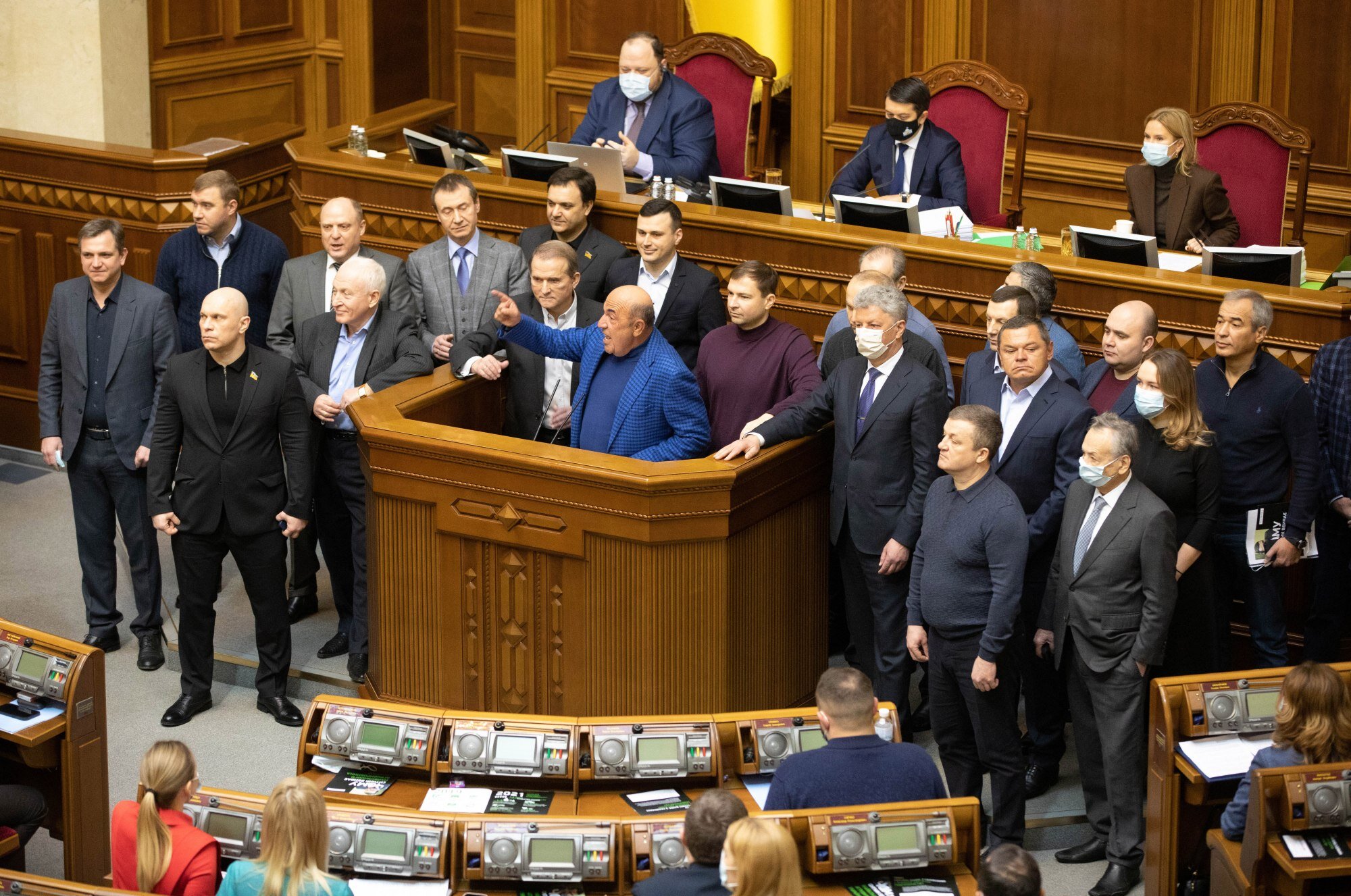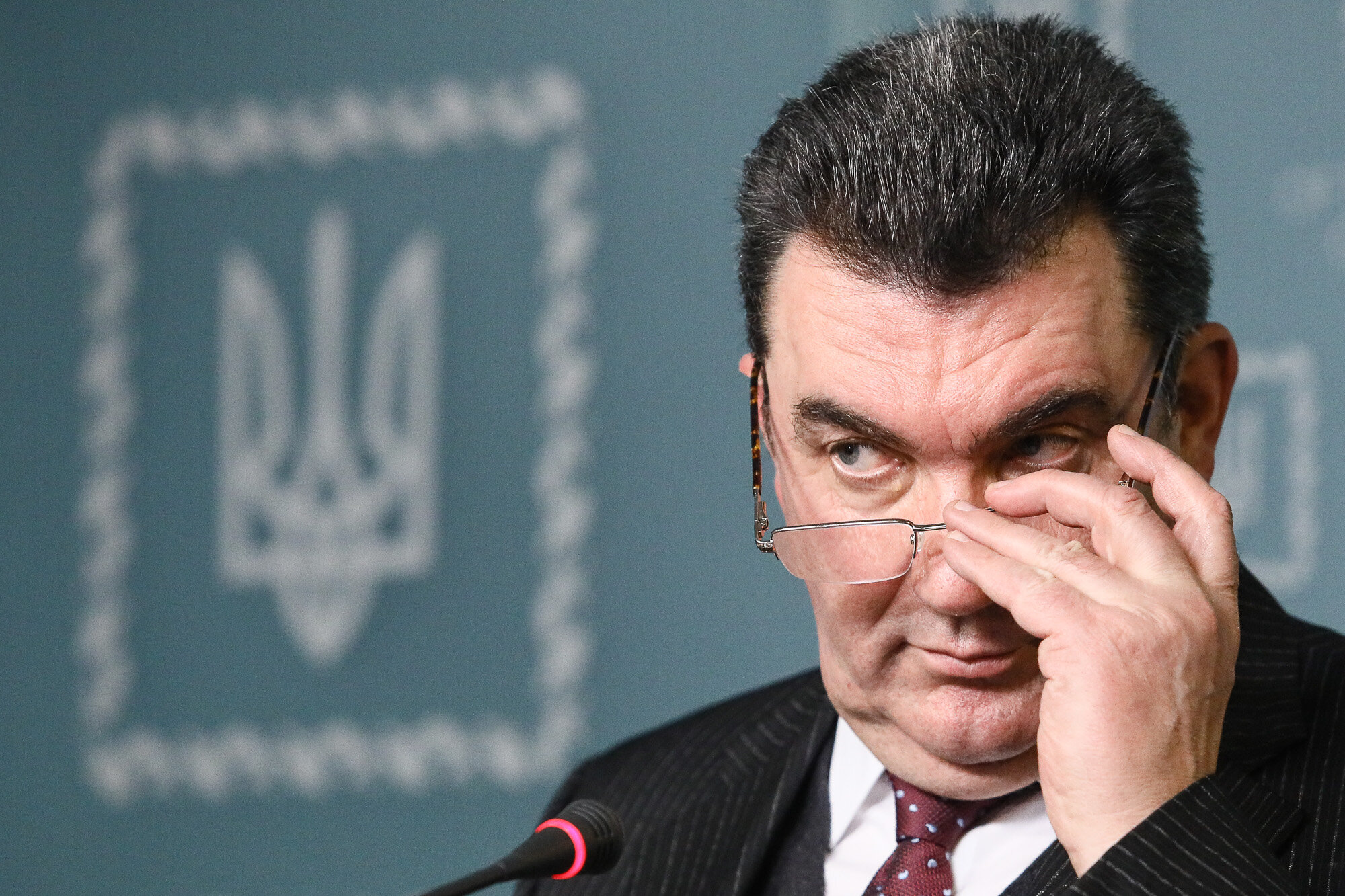After being held back by discredited courts and a decentralized and malfunctioning parliament, President Volodymyr Zelensky found a way to fast-track his agenda.
The National Security and Defense Council has suddenly become the most talked-about institution under Zelensky. Since early February, the council has imposed severe sanctions on those either considered untouchable or who have been left, with some exceptions, mostly unscathed by Ukraine’s judicial system.
In what could be called a very belated act, the latest targets include ousted ex-President Viktor Yanukovych and his associates ex-Prime Minister Mykola Azarov and fugitive oligarch Serhiy Kurchenko, who is still believed to be doing business in Kremlin-occupied Donbas.
These people and many other members of the Yanukovych administration, however, fled the country more than seven years ago because of the EuroMaidan Revolution that ousted them.
This council this year also voted to topple the TV empire and other businesses of pro-Kremlin lawmaker Viktor Medvedchuk, leader of the 44-member Opposition Platform — For Life party.

Starting from Feb. 2, the National Security and Defense Council began imposing sanctions against high-profi le Ukrainian citizens for sponsoring Russian-led militants. Among those sanctioned by the NSDC are officials who worked under ex-President Viktor Yanukovych, former Ukrainian citizens who sided with Russia and two current Ukrainian lawmakers Viktor Medvedchuk and Taras Kozak, known for being close to the Kremlin. Their close associates were also included in the sanctions list.
There is speculation about who else will end up under sanctions and whether the council will be used to finally tackle Ukraine’s oligarchs. The council’s almost-weekly Friday meetings became a must-watch series.
“We’re talking about a mechanism that’s instant, doesn’t require a formal investigation and doesn’t need to go through court,” said Volodymyr Fesenko, head of the Penta Center for Political Studies.
“Zelensky loves it,” Fesenko added.
History of insignificance
The National Security and Defense Council has been around since 1996. But its powers varied.
The council was created under then-President Leonid Kuchma to advise the president on national security, gather intelligence from all government agencies and react quickly to crises.
In 2014, the NSDC was given power to impose sanctions on foreign citizens, companies, countries and industries, introduce martial law and force Ukrainian government bodies, such as the Security Service of Ukraine and the Interior Ministry to investigate people, companies and organizations.
Ukrainian citizens and companies can only be sanctioned if they sponsor terrorism, which includes financing or doing business in Russian-occupied areas of Ukraine.
The council is headed by the president and includes top government officials, including the prime minister, the head of the Security Service, the interior minister, and the head of counter intelligence.
Today it consists of 21 people. The only appointee is the council’s secretary, Oleksiy Danilov, who presides over the NSDC’s day-to-day work.
In the past, the council has rarely made so many headlines.
Poroshenko’s sanctions
In 2014, after Russia launched its ongoing war against Ukraine, parliament voted to expand NSDC’s powers.
One of the council’s best-known moments under ex-President Petro Poroshenko came in 2017, when it imposed sanctions on 1,128 people and several Russian companies. Most famously, it blocked popular Russian social media Vkontakte and Odnoklasniki, as well as online service Yandex.
But Poroshenko wasn’t consistent in his approach to Russian-affiliated people and companies.
In October 2018, he stopped the council from banning pro-Kremlin TV channels affiliated with Medvedchuk. He said he wanted to avoid accusations of attacking freedom of speech.
Around the same time, Poroshenko used the council to impose a monthlong martial law in regions that border Russia after the Kremlin attacked and seized Ukrainian military vessels.
Zelensky’s weapon
Zelensky’s didn’t deploy the council until 1.5 years into his presidency, when his control over parliament weakened.
“We understand that there’s an oligarchic influence over parliament, it’s sometimes hard to find the required votes, the judicial system is unreformed, in these circumstances the NSDC becomes an instrument through which it is easier to implement swift decisions,” said Oleksiy Haran, research director of the Democratic Initiatives sociological institute.
Zelensky’s 245-member Servant of the People faction dominates the parliament — on paper. In reality, the influence of oligarchs and shadow power brokers makes the party hard to control.
Billionaire oligarchs Ihor Kolomoisky and Rinat Akhmetov are reported to control some 30 of Zelensky’s lawmakers each.
This was easily spotted during the two failed attempts to appoint former Naftogaz top manager Yuriy Vitrenko as energy minister. The governing party drew only 177 votes.
Frustration over Ukraine’s corrupt and ineffective judicial system likely contributed to Zelensky’s determination to go through the council.
A Ukrainian court has never sentenced a big-fish politician or businessman.
Zelensky got a wake-up call about the state of judiciary when the Constitutional Court and a tainted Kyiv District Administrative Court came close to destroying Ukraine’s anti-corruption infrastructure in October.
With the weak parliament and corrupt courts, Zelensky needed a tool over which he had direct control, and which could implement decisions the judicial and legislative branch couldn’t.
“Zelensky is currently using several instruments to return momentum to his presidency and to maintain electoral support, and the Defense and Security Council is one of these instruments,” said Haran.
Medvedchuk, Fuks, Yanukovych
In October, Danilov, a low-profile political figure, took charge of the NSDC. Sanctions soon followed.
Danilov was the mayor of Luhansk, a regional capital now occupied by Russia, in the mid-1990s, and governor of Luhansk Oblast in the early 2000s.
On Feb. 2, the council issued personal sanctions against Medvedchuk’s closest ally, pro-Kremlin lawmaker Taras Kozak and his three nationwide TV channels — NewsOne, Channel 112, and ZIK, which aired Kremlin propaganda about Ukraine.
The ruling implied that Kozak and Medvedchuk illegally sold coal from Russian-occupied Donbas. As a result of the sanctions, the three TV channels immediately shut down.

Lawmakers from the pro-Kremlin Opposition Platform — For Life party, the second-largest faction in the Verkhovna Rada, issue a statement on the parliament floor on Feb. 3, 2021, denouncing sanctions against lawmaker Taras Kozak and his three TV channels. Kozak is a close ally of party co-leader Viktor Medvedchuk, who is alleged to be the real owner of the channels. (UNIAN)
The decision also served a political goal. Shortly before that, Medvedchuk’s pro-Kremlin party secured first place in the polls, bypassing Zelensky’s Servant of the People party.
The decision was praised by pro-Ukrainian activists, giving the president a green light for further action. In two weeks, Medvedchuk himself was sanctioned.
The public supported these actions.
“It had a positive effect, so now they want to keep imposing sanctions weekly, they want to continue the hype,” says Fesenko.
More recently, the council turned its attention to Yanukovych, Ukraine’s Kremlin-backed president from 2010–2014. Attacking him would boost Zelensky’s popularity.
On March 19, the council imposed individual sanctions against Ukrainian citizens, who collaborated with Russia during its ongoing war against Ukraine.
Among them are Yanukovych, ex-Prime Minister Azarov, fugitive oligarch Kurchenko, Russia-appointed leader of occupied Crimea Sergey Aksyonov, ex-Ukrainian prosecutor turned Russian lawmaker Natalia Poklonskaya and Leonid Pasechnik, the figurehead of Luhansk-based militants.
The sanctions include a ban on financial transactions, asset freezes and cancellation of all permits.
“Zelensky has the political will that Poroshenko didn’t have,” wrote lawmaker Mykyta Poturaev, representing the president’s Servant of the People party. This has become the rhetorical line of Zelensky supporters.
Many facing new restrictions are also under U.S. and European Union sanctions. However, the EU has been gradually lifting sanctions from pro-Kremlin politicians, citing lack of prosecution from Ukraine.
Seven years after the EuroMaidan Revolution, only Yanukovych has been prosecuted for treason. He received a 13-year prison sentence in absentia in 2019.
“It is logical that Ukraine also imposes such sanctions, and it is strange that they haven’t done it in 2014,” said Zelensky after the sanctions against 27 people were made public.
Yanukovych was under sanctions, but the new ones are more severe.
Furthermore, the NSDC imposed sanctions on several companies owned by the low-profile Vitaly Lupeto, who is widely considered to be linked to Russian-Ukrainian energy tycoon Pavlo Fuks. In all, 19 companies were sanctioned.
According to Danilov, all those companies have received permits to extract Ukrainian resources illegally.
The decision to nationalize Motor Sich, a major aircraft engine manufacturer, to keep it out of the hands of China, also came through the council.
Who’s next?
The sanctions against anti-Ukrainian politicians and businesspeople are popular in Ukraine and there are no signs that the process of issuing sanctions will soon stop.
However, the law specifies that only Ukrainians who commit terrorism or treason can be sanctioned, seriously limiting Zelensky and Danilov.

Oleksiy Danilov, the Secretary of the National Security and Defense Council of Ukraine (RNBO), announces the council’s decision to impose sanctions against Viktor Medvedchuk and his associates at a press briefing on Feb. 19, 2021. (Oleg Petrasiuk)
“There’s a great temptation to impose sanctions on Poroshenko or Kolomoisky, but it will raise a lot of questions,” says Fesenko.
Kolomoisky, against whom the U.S. imposed travel restrictions, is involved in an embezzlement scheme, which vacuumed $5.5 billion from PrivatBank, Ukraine’s largest bank, prior to its nationalization.
However, Poroshenko and Kolomoisky have not been linked to terrorism.
According to Fesenko, the Council will concentrate on Yanukovych and continue flogging a dead horse.
“You can’t find new people each week to impose sanctions on,” he added.
On March 11, the NSDC ordered the Security Service of Ukraine to investigate possible treason committed by a number of high-profile lawmakers in 2010.
Back then, 236 pro-Kremlin lawmakers voted to allow the Russian Black Sea fleet to maintain a permanent base in the Ukrainian city of Sevastopol in Crimea until 2042.
Danilov has pointed out that Ukraine will also assess all decrees issued by Yanukovych for possible treason.
“We must not forget that prosecuting lawmakers for political decisions is inadmissible in court,” said Haran. “It’s a symbolic gesture that will be used from a political standpoint.”
Fesenko said that the weekly sanctions are getting out of hand and one should know where to draw a line.
Who came under sanctions of National Security and Defense Council in 2021:
Medvedchuk’s sanctions:
- Opposition Platform – For Life lawmakers Viktor Medvedchuk and Taras Kozak
- TV Host Oksana Marchenko, wife of Medvedchuk; Natalya Lavrenyuk, common-law wife of Kozak
- Russian citizens Konstantin Vatskovsky, Vitaly Domchenko, Sergey Lisogor, Alexander Maslyuk and Mikhail Popov.
Yanukovych-era military command, prosecutors and police officers who committed treason:
- Ex-Interior Minister Vitaly Zakharchenko & ex-Security Service Head Oleksandr Yakymenko.
- Ex-Ukrainian officers who deflected to Russia Sergey Nanchur, Stanislav Shaportov, Denis Berezovsky, Yuriy Kotovskiy, Vladimir Totskiy, Sergey Ganja, Sergey Eliseev, Dmitry Shakuro, Sergey Abisov, Valery Hrytsay, Petro Zyma, Andrey Ivantsov, Oleg Kirilin, Aleksandr Poddubov, Nikolai Tkachenko, Mykola Fedoryan (arrested), Olga Chichilimova.
Yanukovych-era officials:
- Ex-President Viktor Yanukovych, ex-Prime Minister Mykola Azarov, ex-Prosecutor General Viktor Pshonka, ex-Education Minister Dmytro Tabachnyk.
- Ex-Defense Minister Pavlo Lebedev, ex-Defense Minister and presidential advisor Dmytro Salamatin, ex-deputy Defense Minister Oleksandr Cherpitsky.
- Ex-National Bank Head Ihor Sorkin.
- Fugitive oligarch Serhiy Kurchenko.
- Ex-Ukrainian prosecutor turned Russian lawmaker Natalia Poklonskaya.
- ex-lawmaker Oleksandr Bobkov & Vadym Kolesnichenko.
- Serhiy Kosyuk, head of Berkut riot police detachment.
Russian officials and leaders of occupying forces:
- Russian lawmaker Konstantin Zatulin.
- Russian-appointed head of occupied Crimea Sergey Aksenov.
- Russian-appointed ex-head of occupied Sevastopol Vladimir Konstantinov.
- Russian-appointed leader of Luhansk-based militants Leonid Pasechnik.
- Russian officials – Aleksandr Gorovoy, Valentina Kazakova, Kirill Adzinov, Oleg Levchenko, Anna Guryanova, Vladimir Khlystov, Oleg Agarkov, Aleksandr Bashkin, Vsevolod Vukolov, Igor Zubkov, Aleksandr Karlin, Vladislav Menshikov, Ludmila Narusova, Irina Rukavishnikova, Oleg Tsepkin, Aleksey Minin, Alexei Morenets, Evgenii Serebriakov, Oleg Sotnikov, Mikhail Gorshkov, Sergey Molyakov, Aleksandr Ganov, Leonid Ryzhenkin.
French lawmakers who visited occupied Crimea
Philippe Olivier, Jean-Lin Lacapelle, Virginie Joron all representing the far-right National Rally.
